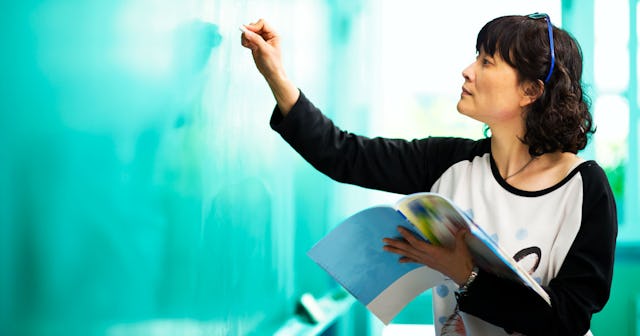'Best' Shouldn't Be Our Ultimate Goal As Humans Or Allies — Here's Why

I am a LGBTQIA+ educator and advocate, and a teacher recently asked if I could help her school establish best practices for LGBTQIA+ inclusivity in their classrooms. She wanted to do what was best for all students and didn’t want to mess anything up. I thanked her for being so intentional and willing to make her school safer and more comfortable for queer students. I let her know I could absolutely help her, and I touched on a few of the training models I use. I also promised her a few things: staff would learn actionable steps to take in their classrooms and everyday interactions with students; staff would gain a better understanding about themselves in a way that would help them understand their students; staff will mess this up. She was a mix of horrified and relieved. “Practice makes mistakes,” I told her. “I’m going to help you establish better practices, not best.”
I went on to tell this new client that I expected people to try their best while making changes, but if the goal is to be what we know is “best” right now, then there is a good chance we will lose space for growth and vulnerability. When providing diversity and inclusion trainings to schools, businesses, or organizations, my goal will always be to help people be better, put better systems in place, and to provide spaces that are better than they were before. But we can never stop improving — so I ask people to reframe their actions from “best” to “better”.
Best indicates perfection and that’s either impossible or fleeting. Getting to one’s best often means growing stagnant and ignorant of fluctuating nuance. Being the best and staying there often means being left behind—looking at you Mike Lazaridis, creator of BlackBerry.
LGBTQIA+ topics and the people who deserve respect and support can’t be boiled down to “best practices.” We are not a monolith and while there are plenty of blanketed ways to make policy and spaces more inclusive, we need to be ready to adjust, change language, and correct what we once thought was correct. I want all of my clients to know that I don’t expect perfection, but I do expect accountability and the desire to keep learning. I want them to embrace better practices in all aspects of their lives.
Jon Vallejo/Getty
When we strive for better practices instead of best practices, we are committing to constant improvement and understanding. This can be applied to all aspects of life from personal goals to business solutions. If we reach the top, then what? Likely there will be a bigger mountain to climb, harder problems to solve, and more meaningful conversations to be had. Best practices are often only a measure of current circumstances. The wagon was the best form of transportation at one time, but what if we settled on that as the end goal? This is true for the typewriter, surgical tools, and child car seats.
My best deadlift right now is better than my best deadlift a year ago. My mac n’ cheese is delicious, but I’m always trying to improve it. My patience with my kids is a constant state of change, but I hope that it’s slowly improving as I grow and improve as a human.
Being better vs. being best isn’t letting someone off the hook, but it is a way to meet them with flexibility and grace. Maybe your relationship with a friend, partner, or family member isn’t where you want it to be. You have both committed to open communication, boundaries, and honesty but there is still work to do in order to repair damage. You or they may fuck up and your relationship will be anything but its best, but is it better? Are you both working to make it work for you? Are you comparing your relationship to others and gauging if off of what you think is ‘best’ or are you creating attachments and navigating social interactions that establish better patterns than ones you previously knew? There are red flags and green flags when it comes to relationships, but there is never a one-size-fits-all approach that is going to be best for everyone.
I try to keep this in mind when I’m actively parenting my child through something that’s difficult. What works for one kid doesn’t work for another and my and their best versions of ourselves don’t always collide; I don’t expect my kids to be perfect so why do I beat myself up at times to be a perfect parent? Perfection and knowing the ‘right’ or best thing to do at all times is unattainable and wishful thinking. When I get frustrated with myself because I yelled more than I wanted to or didn’t hold my ground on consequences, I try to take in the big picture and observe what I did well that is getting me to be a better parenting version of myself.
When I get frustrated at my children for leaving giant messes they know they are responsible for cleaning or if I have to remind them to stop interrupting a conversation, I tell them to do better. I know they’re going to fuck up, but if they clean up one or two more times than before and interrupt less, that’s improvement and creating patterns that are more respectful and self-aware.
Whether it’s work-related or a personal goal outside of anyone else, today’s best practices may not survive tomorrow’s new information or work for new problems or situations that present themselves. Rules change. Our needs change. If we’re prepared to be better each day, then we’re better prepared to get to checkpoints and next steps. We’re less likely to settle if we get rid of the idea that being the best is the ultimate achievement.
This article was originally published on